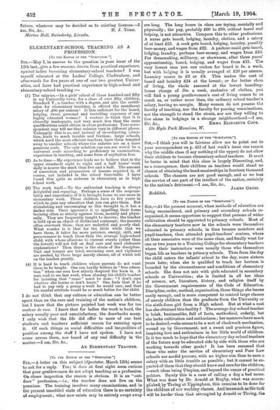ELEMENTARY-SCHOOL TEACHING AS A PROFESSION.
[To THE EDITOR OF THE " SPECTATOR.1
SIR,—May I, in answer to the question in your issue of the 12th inst., give a few reasons, drawn from practical experience, against ladies becoming elementary-school teachers ? I was myself educated at the Ladies' College, Cheltenham, and afterwards for five years at one of our two greatest Univer- sities, and have had practical experience in high-school and elementary-school teaching :— (1) The salaries.—In a girls' school of three hundred and fifty in my University town, for a class of over fifty children, Standard V., a teacher with a degree, and also the certifi- cates for elementary teaching, is offered the munificent salary of 480 per annum ! Is this sufficient for the board, lodging, dress, personal and travelling expenses of any highly educated woman ? I venture to think that it is absurdly inadequate, and very much less than the same qualifications could obtain in other professions. Your corre- spondent may tell me that salaries vary in different places. Unhappily this is so, and instead of co-ordinating educa- tion, leads to much trouble and friction; large schools, which need the most efficient teachers, have them tempted away to smaller schools where the salaries are on a more generous scale. The only solution one can see would be a universal scale according to proficiency in examination, experience in teaching, and some form of capitation fees.
(2) As to time.—My experience leads me to believe that in the upper standards eight to eight and a half hours'. work daily is nearer the mark than five and a half. The amount of correction and preparation of lessons required .is, of course, not included in the school time-table. I have found this quite as arduous in eleinentary as in high school work.
The work itself.—To the enthusiast teaching is always delightful and repaying. Perhaps a sense of the responsi- bility and importance of it is brought home to one more in elementary work. These children have so few years in which to gain any education that you can give them. But stimulating and encouraging as this thought is, it has a darker side. Their ignorance is so appalling, their home training often so utterly against them, morally and physi- cally. They are frequently taught to deceive; the teacher is held up as an object of dislike and contempt; the parents often overwork them; they are underfed and poorly clad. What wonder is it that for the little while that we have them, it takes far more patience, energy, skill, and perseverance to teach them than the average high-school child, with whom allusions to current events (other than the lowest) will not fall on deaf ears and need elaborate explanations? Then there is the strain of the discipline. Tact and temper are tried, unceasing care and vigilance are needed, by these large unruly classes, all of which tell on the teacher greatly.
It is hard to teach children whose parents do not want them to be taught. One can hardly believe in "free educa- tion" when one sees how utterly despised the boon is. A man said to me last week, when abusing his child's teacher for insisting that " sums " must be done : "I don't care whether she learns or don't learn." One feels that if he had to pay only a penny a week he would care, and that his mental attitude would be so much better for the child.
I do not think that any culture or education can be better spent than on the care and training of the nation's children, but I know that the picture painted last week was far too couleur de rose. I know that for ladies the work is hard, the salary usually poor and unsatisfactory, the drawbacks many.
I only wish that the life did offer to more of our best students and teachers sufficient reason for entering upon it. Of such things as social difficulties and inequalities of position among the staff I have not spoken. I have not come across them, nor heard of any real difficulty in the matter.—I am, Sir, &c.,
AN ELEMENTARY TEACHER.










































 Previous page
Previous page